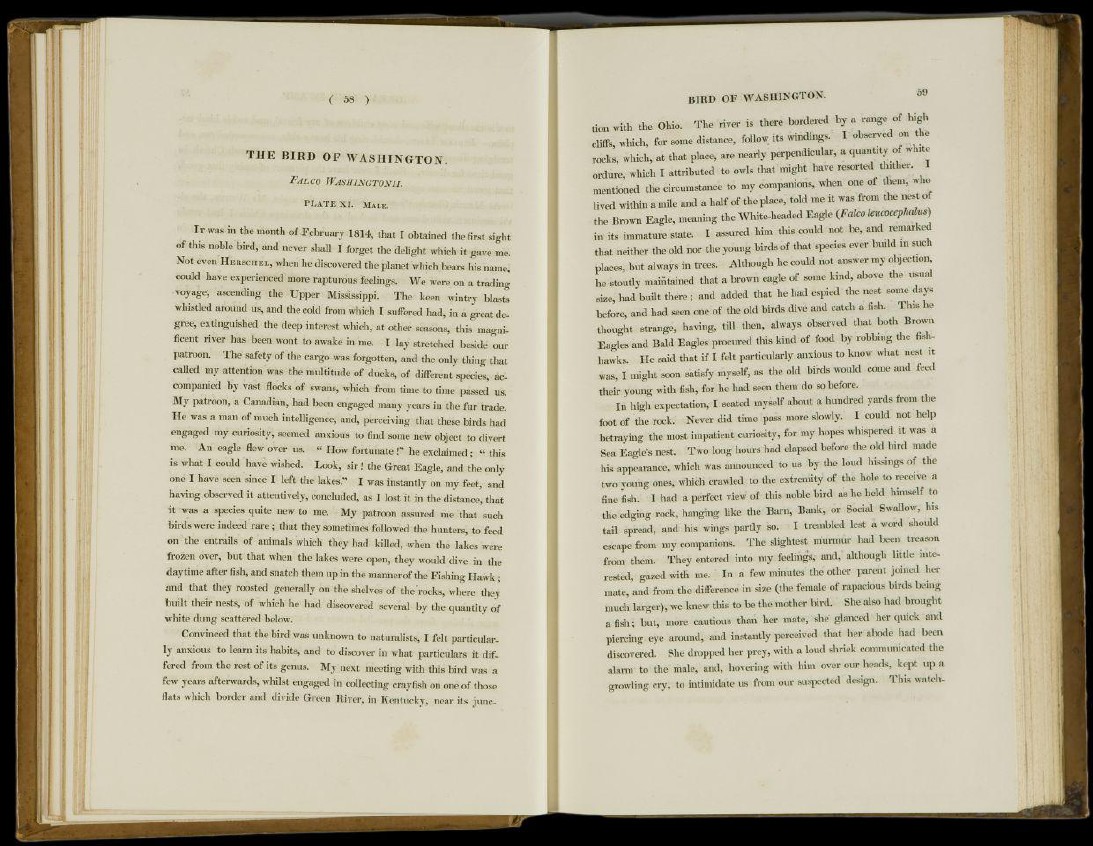
( 58 )
T H E B I R D O F W A S H I N G T O N .
FALCO WASHING TONII.
P L A T E X I . MALE.
I T was in the month of February 1814, that I obtained the first sight
of this noble bird, and never shall I forget the delight which it gave me.
Not even HERSCHEL, when he discovered the planet which bears his name,
could have experienced more rapturous feelings. We were on a trading
voyage, ascending the Upper Mississippi. The keen wintry blasts
whistled around us, and the cold from which I suffered had, in a great degree,
extinguished the deep interest which, at other seasons, this magnificent
river has been wont to awake in me. I lay stretched beside our
patroon. The safety of the cargo was forgotten, and the only thing that
called my attention was the multitude of ducks, of different species, accompanied
by vast flocks of swans, which from time to time passed us.
My patroon, a Canadian, had been engaged many years in the fur trade.
He was a man of much intelligence, and, perceiving that these birds had
engaged my curiosity, seemed anxious to find some new object to divert
me. An eagle flew over us. " How fortunate !" he exclaimed; " this
is what I could have wished. Look, sir! the Great Eagle, and the only
one I have seen since I left the lakes." I was instantly on my feet, and
having observed it attentively, concluded, as I lost it in the distance, that
it was a species quite new to me. My patroon assured me that such
birds were indeed rare ; that they sometimes followed the hunters, to feed
on the entrails of animals which they had killed, when the lakes were
frozen over, but that when the lakes were open, they would dive in the
daytime after fish, and snatch them up in the manner of the Fishing Hawk;
and that they roosted generally on the shelves of the rocks, where they
built their nests, of which he had discovered several by the quantity of
white dung scattered below.
Convinced that the bird was unknown to naturalists, I felt particularly
anxious to learn its habits, and to discover in what particulars it differed
from the rest of its genus. My next meeting with this bird was a
few years afterwards, whilst engaged in collecting crayfish on one of those
flats which border and divide Green River, in Kentucky, near its junc-
BIRD OF WASHINGTON. 50
tion with the Ohio. The river is there bordered by a range of high
cliffs, which, for some distance, follow its windings. I observed on the
rocks, winch, at that place, are nearly perpendicular, a quantity of white
ordure, which I attributed to owls that might have resorted thither. I
mentioned the circumstance to my companions, when one of them, who
lived within a mile and a half of the place, told me it was from the nest of
the Brown Eagle, meaning the White-headed Eagle (Falco Uucocephalus)
in its immature state. I assured him this could not be, and remarked
that neither the old nor the young birds of that species ever build in such
places, but always in trees. Although he could not answer my objection,
he stoutly maintained that a brown eagle of some kind, above the usual
size, had built there; and added that he had espied the nest some days
before, and had seen one of the old birds dive and catch a fish. This he
thought strange, having, till then, always observed that both Brown
Eagles and Bald Eagles procured this kind of food by robbing the fishhawks.
He said that if I felt particularly anxious to know what nest it
was, I might soon satisfy myself, as the old birds would come and feed
their young with fish, for he had seen them do so before.
In high expectation, I seated myself about a hundred yards from the
foot of the rock. Never did time pass more slowly. I could not help
betraying the most impatient curiosity, for my hopes whispered it was a
Sea Eagle's nest. Two long hours had elapsed before the old bird made
his appearance, which was announced to us by the loud hissings of the
two young ones, which crawled to the extremity of the hole to receive a
fine fish. I had a perfect view of this noble bird as he held himself to
the edging rock, hanging like the Barn, Bank, or Social Swallow, his
tail spread, and his wings partly so. I trembled lest a word should
escape from my companions. The slightest murmur had been treason
from them. They entered into my feelings, and, although little interested,
gazed with me. In a few minutes the other parent joined her
mate, and from the difference in size (the female of rapacious birds being
much larger), we knew this to be the mother bird. She also had brought
a fish; but, more cautious than her mate, she glanced her quick and
piercing eye around, and instantly perceived that her abode had been
discovered. She dropped her prey, with a loud shriek communicated the
alarm to the male, and, hovering with him over our heads, kept up a
growling cry, to intimidate us from our suspected design. This watch